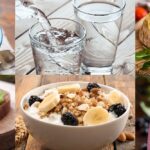A low-carb meal plan can aid weight loss and muscle gain effectively by focusing on protein-rich foods. This type of diet can help you achieve your fitness goals by reducing carb intake and increasing protein consumption.
Many individuals have found success in building muscle and shedding fat through a well-structured low-carb meal plan. By incorporating lean meats, fish, eggs, nuts, and plenty of vegetables, you can fuel your body for workouts and support muscle growth while promoting fat loss.
It is important to strike a balance between protein, healthy fats, and limited carbs to optimize your body composition and overall health. By following a tailored low-carb meal plan, you can work towards your weight loss and muscle gain objectives efficiently.
Introduction To Low-carb Eating
Embarking on a low-carb meal plan for weight loss and muscle gain can be a transformative journey towards a healthier lifestyle. Low-carb eating involves reducing the consumption of carbohydrates while increasing intake of protein and healthy fats. This approach aims to optimize weight loss, enhance muscle growth, and improve overall health and well-being.
Why Low-carb?
Low-carb eating has gained popularity due to its effectiveness in promoting weight loss and muscle gain. By restricting carbohydrates, the body shifts from using glucose as its primary energy source to burning fat for fuel, leading to increased fat loss. Additionally, low-carb diets can improve insulin sensitivity, reduce cravings, and support sustainable weight management.
Balancing Macronutrients
When following a low-carb meal plan, it’s crucial to balance macronutrients by prioritizing high-quality sources of protein, healthy fats, and fiber-rich vegetables. This ensures that the body receives essential nutrients while minimizing the intake of refined sugars and processed carbohydrates, which can contribute to weight gain and hinder muscle development.
Benefits Of A Low-carb Diet
Opting for a low-carb meal plan can aid in weight loss and muscle gain. By reducing carb intake, the body shifts to burning fat for fuel, promoting fat loss while preserving muscle mass. This approach can also help regulate blood sugar levels and improve overall health.
Weight Loss Potential
A low-carb meal plan is effective for weight loss due to reduced insulin levels, leading to increased fat burning.
Muscle Preservation
Low-carb diets help preserve muscle mass by promoting fat as the primary energy source, sparing protein breakdown.
Benefits of a Low-Carb Diet:
- Stimulates fat burning
- Reduces hunger and cravings
- Improves blood sugar levels
- Enhances mental clarity and focus
- Increases energy levels
Planning Your Low-carb Meals
When planning your low-carb meals for weight loss and muscle gain, it’s essential to focus on the right balance of macros, portion sizes, and timing to optimize your results. Here are some key factors to consider:
Calculating Your Macros
Calculating your macros is crucial for achieving your weight loss and muscle gain goals. Focus on high protein to support muscle growth and repair, moderate healthy fats, and limited carbohydrates to promote fat burning and stable energy levels.
Portion Sizes And Timing
Portion sizes play a significant role in a low-carb meal plan. Ensure adequate protein intake to support muscle growth, moderate healthy fats for satiety, and controlled portion of carbohydrates to prevent blood sugar spikes.
Timing your meals is also important. Consume protein-rich meals post-workout to aid muscle recovery and growth. Spread your carb intake throughout the day to support energy levels and prevent cravings.
Essential Foods For A Low-carb Plan
Fuel your low-carb plan for weight loss and muscle gain with essential foods like lean meats, fish, eggs, nuts, and leafy greens. These nutrient-dense options support protein intake and promote muscle recovery and growth, aiding in your fitness goals.
Essential Foods for a Low-Carb Plan
If you’re looking to lose weight and build muscle, a low-carb meal plan may be the way to go. But what are the essential foods you need to include in your diet? We’ve broken it down into two categories: protein-rich foods and low-carb vegetables.
Protein-Rich Foods
Protein is essential for building and repairing muscles, making it a crucial component of any muscle gain plan. Here are some protein-rich foods to include in your low-carb meal plan:
– Chicken breast: A 3-ounce serving of chicken breast contains about 27 grams of protein and zero carbs.
– Fish: Salmon, tuna, and other fatty fish are great sources of protein and healthy fats.
– Eggs: Eggs are not only high in protein, but they also contain healthy fats and essential vitamins and minerals.
– Greek yogurt: A 6-ounce serving of Greek yogurt contains about 18 grams of protein and only 7 grams of carbs.
– Whey protein: If you’re having trouble getting enough protein from whole foods, a whey protein supplement can help.
Low-Carb Vegetables
Vegetables are an important source of vitamins, minerals, and fiber, but some are higher in carbs than others. Here are some low-carb vegetables to include in your meal plan:
– Broccoli: A cup of broccoli contains only 6 grams of carbs and is packed with vitamins and minerals.
– Spinach: A cup of spinach contains only 1 gram of carbs and is a good source of iron and other nutrients.
– Cauliflower: A cup of cauliflower contains only 5 grams of carbs and can be used as a low-carb substitute for rice or potatoes.
– Bell peppers: A cup of sliced bell peppers contains only 6 grams of carbs and is a good source of vitamin C.
– Zucchini: A cup of sliced zucchini contains only 4 grams of carbs and is a versatile vegetable that can be used in many recipes.
Incorporating these essential foods into your low-carb meal plan can help you achieve your weight loss and muscle gain goals. Remember to consult with a healthcare professional before starting any new diet or exercise plan.
Building Muscle On Low-carb
For weight loss and muscle gain, consider a low-carb meal plan. While high-protein, low-carb diets can build muscle, optimal performance may require sufficient carb intake to fuel physical activity effectively. Balance is key to achieving the best results for your body and muscles.
Building Muscle on Low-Carb
When it comes to building muscle on a low-carb diet, protein intake and resistance training considerations are crucial. Without adequate protein intake, muscle growth will be limited, while resistance training is necessary to stimulate muscle growth. Let’s take a closer look at these two factors.
Protein Intake For Muscle Gain
Protein is the building block of muscle, and adequate intake is essential for muscle growth. According to research, consuming 0.8-1 gram of protein per pound of body weight per day is sufficient for most people. However, those looking to build muscle may benefit from consuming up to 1.5-2 grams per pound of body weight.
Good sources of protein on a low-carb diet include meat, fish, eggs, and dairy products. Vegetarians can opt for plant-based sources such as tofu, tempeh, and legumes. It’s also important to spread protein intake throughout the day, with each meal containing a good source of protein.
Resistance Training Considerations
Resistance training is necessary to stimulate muscle growth, regardless of the type of diet. However, when following a low-carb diet, there are a few considerations to keep in mind. Firstly, it’s important to fuel your workouts with adequate protein and fat, as carbs are not readily available for energy.
Secondly, recovery is crucial for muscle growth. Adequate rest between workouts, as well as proper nutrition, is necessary for muscle recovery and growth. Finally, it’s important to gradually increase the intensity and volume of your workouts over time to continue stimulating muscle growth.
In conclusion, building muscle on a low-carb diet is possible with adequate protein intake and proper resistance training. By following these guidelines, you can achieve your muscle-building goals while maintaining a low-carb lifestyle.
Sample Low-carb Meal Ideas
Embarking on a low-carb meal plan doesn’t mean sacrificing delicious and satisfying dishes. In fact, there are plenty of options to keep your taste buds happy while supporting your weight loss and muscle gain goals. Here are some tantalizing low-carb meal ideas to get you started:
Breakfast Options
Starting your day with a nutritious and low-carb breakfast can set the tone for successful weight loss and muscle gain. Consider these breakfast options:
- Avocado and Egg Toast: A slice of low-carb bread topped with mashed avocado and a poached egg.
- Greek Yogurt Parfait: Layer Greek yogurt with berries and a sprinkle of nuts for a protein-packed breakfast.
- Spinach and Feta Omelette: Whisk together eggs, spinach, and feta cheese for a flavorful and low-carb omelette.
Lunch And Dinner Recipes
For satisfying and filling meals that support your low-carb goals, try these lunch and dinner recipes:
| Meal | Recipe |
|---|---|
| Lunch | Grilled Chicken Salad |
| Tuna Lettuce Wraps | |
| Cauliflower Crust Pizza | |
| Dinner | Salmon with Asparagus |
| Zucchini Noodles with Pesto | |
| Stuffed Bell Peppers |
Navigating Challenges And Plateaus
Navigate challenges and plateaus with a low-carb meal plan for weight loss and muscle gain. By incorporating high-protein foods and healthy fats, you can fuel your body for optimal performance and muscle development. Overcoming obstacles and reaching your fitness goals is possible with the right nutrition strategy.
Dealing With Cravings
Adjusting The Plan For Results
Navigating Challenges and Plateaus
Embarking on a low-carb meal plan for weight loss and muscle gain can present challenges and plateaus along the way. One common hurdle is dealing with cravings, while another is the need to adjust the plan for continued results.
Dealing With Cravings
Cravings can derail your progress on a low-carb meal plan. To combat this, focus on consuming nutrient-dense foods that keep you feeling full and satisfied. Incorporate healthy fats and protein to stabilize blood sugar levels and reduce cravings.
Tips to tackle cravings:
– Stay hydrated to prevent dehydration-induced hunger.
– Plan ahead and have low-carb snacks readily available.
– Opt for whole foods over processed alternatives to curb cravings.
Adjusting The Plan For Results
As your body adapts to a low-carb meal plan, you may reach a plateau in your weight loss or muscle gain journey. To overcome this, consider making adjustments to your plan. Increase protein intake to support muscle growth and incorporate carb cycling to keep your metabolism active.
Strategies for adjusting the plan:
1. Experiment with different low-carb foods to keep meals exciting.
2. Monitor your progress and make changes accordingly.
3. Incorporate regular exercise to support your goals.
By navigating challenges such as cravings and plateaus with a proactive approach, you can optimize your low-carb meal plan for sustained weight loss and muscle gain.
Supplements To Enhance Performance
When following a low-carb meal plan for weight loss and muscle gain, incorporating the right supplements can significantly enhance your performance and support your fitness goals. Whether you are looking to boost energy levels, improve recovery, or increase muscle mass, the right supplements can provide valuable support.
Recommended Supplements
When it comes to enhancing performance on a low-carb meal plan, certain supplements are particularly beneficial:
- Whey Protein: Ideal for muscle recovery and growth
- Creatine: Enhances strength and power during workouts
- BCAAs (Branched-Chain Amino Acids): Supports muscle recovery and reduces muscle fatigue
- Omega-3 Fatty Acids: Aids in reducing inflammation and supporting overall health
- Electrolyte Supplements: Helps maintain proper hydration levels
Natural Alternatives
Alternatively, natural sources can provide similar benefits without the need for supplements:
- High-Protein Foods: Incorporate lean meats, eggs, and dairy for adequate protein intake
- Healthy Fats: Include sources like avocados, nuts, and seeds for essential fatty acids
- Complex Carbohydrates: Opt for fiber-rich vegetables and limited fruit intake for sustainable energy
- Hydration: Prioritize water intake and consume electrolyte-rich foods like coconut water
Monitoring Your Progress
Monitoring your progress is crucial when following a low-carb meal plan for weight loss and muscle gain. By tracking changes and knowing when to modify your approach, you can ensure that your diet and exercise regimen are effectively helping you reach your goals.
Tracking Changes
Keep a record of your weight, body measurements, and physical performance to monitor your progress. This can help you determine if the low-carb meal plan is supporting your weight loss and muscle gain objectives. Additionally, consider keeping a food diary to track your daily macronutrient intake, ensuring that you are adhering to the low-carb guidelines.
When To Modify Your Approach
If you notice a plateau in your weight loss or muscle gain, it may be time to modify your low-carb meal plan. Look for signs of decreased energy levels or stalled progress in your weight and measurements. Adjust your macronutrient ratios, meal timing, or exercise routine to overcome the plateau and continue making progress towards your goals.
Long-term Sustainability
When embarking on a low-carb meal plan for weight loss and muscle gain, it’s crucial to consider the long-term sustainability of your dietary choices. Sustainability plays a key role in ensuring that your meal plan is not only effective in the short term but also manageable and beneficial in the long run.
Maintaining A Balanced Diet
- Include a variety of nutrient-dense foods
- Focus on whole foods like vegetables, fruits, lean proteins
- Ensure adequate intake of essential nutrients
Lifestyle Integration
Integrate your meal plan into your daily life for sustainable success:
- Plan meals ahead for convenience
- Prepare meals in advance to avoid unhealthy choices
- Stay consistent with your eating habits
Frequently Asked Questions
Can You Build Muscle On A Low-carb Diet?
Yes, you can build muscle on a low-carb diet by focusing on high-protein intake. However, optimal muscle performance may not be achieved without sufficient carb intake.
What Happens If You Only Eat Protein And No Carbs?
Eating only protein and no carbs can lead to nutrient deficiencies, bad breath, headaches, and constipation. While muscle growth is possible, optimal performance requires a balance of protein and carbs.
How Much Carbs Should I Eat To Gain Muscle And Lose Fat?
To gain muscle and lose fat, aim for a moderate carb intake, around 40-50% of your daily calories. This will provide energy for workouts and support muscle growth while helping to control overall calorie intake for fat loss.
What Is The 40 40 20 Meal Plan?
The 40 40 20 meal plan is a diet plan that recommends consuming 40% of calories from carbohydrates, 40% from protein, and 20% from fat. This plan is often used by athletes and bodybuilders to gain muscle mass while minimizing fat gain.
However, individual results may vary based on factors such as age, gender, activity level, and overall health.
Conclusion
Balancing protein and carb intake is crucial for muscle gain and weight loss. While low-carb diets can aid in shedding pounds, adequate carbs are essential for optimal physical performance and muscle building. It’s important to find the right balance for your body’s needs.



